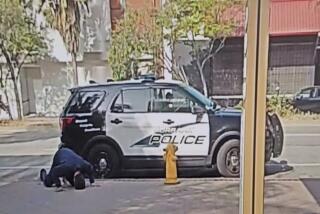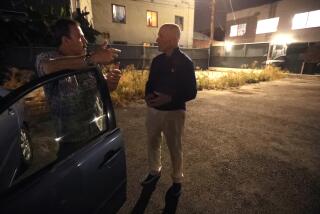Looking Deep Into the Haunted Eyes of the Homeless
Her eyes used to be bluer, years ago when she lingered outside coffee hangouts in Santa Monica and asked people for a dollar. She didn’t ask everyone; she seemed to choose the people she approached according to some instinct honed on the street. But she always asked for one dollar, not two, not spare change. More than seven years ago, when I lived in the neighborhood, I’d see her several mornings a week. She always asked me, and I always had a dollar ready. There were other homeless people whom I saw just as often--regulars who walked up and down the same streets, lingered outside the same restaurants. But she stuck in my mind. I guessed her to be pretty young.
One morning, I didn’t notice her until she appeared at my car window after I’d gotten a coffee to go. She stood about 6 inches from the car, leaned down and said, “Excuse me, could you spare a dollar?”
It was the first time our eyes had actually met. Before that, she’d always tilted her head down, focusing on the sidewalk. I handed her a dollar and looked into eyes that were the same shade of blue as the sky behind her--that early morning sky that seems to be the color of newness, of hope, of promise. I wondered as I drove away if this woman ever looked up, over the rooftops, over the life she lived, if she knew how blue the sky was early in the morning. I wondered if she ever hoped or dreamed. Her skin was burnished and raw from exposure; her hair was stringy and dirty, barely blond. Her clothes were filthy and ragged, her shoes taped together with what looked like adhesive tape.
Years have gone by. I moved across the country, lived on the East Coast, and then returned to California. She is still walking along the same streets, but differently. At first I didn’t recognize her. She has the shuffle of a stooped, elderly person, and she is even more ragged, more caked with dirt. I spot her frequently, but I never see her lingering outside doorways anymore asking for money. I just see her scuffling along, head down, eyes on the sidewalk beneath her feet.
Last week, I was walking around Santa Monica while my car was getting an oil change. I turned a corner in a residential area and saw her on the other side of the street. She was clutching a brown paper shopping bag with something stuffed inside it--maybe a blanket, I thought, by the way she was holding it. Maybe that’s everything she has in the world, except for the other blanket she had draped around her shoulders. I wanted to give her money, but I didn’t want to startle her by running across the street toward her. So I circled behind her, went up the alley and came down the sidewalk in front of her. All I had in my wallet was $2. I held it in my hand and when I got near her, I said, “Hi, can I give you this?”
She took the money with a filthy hand. Then she looked up with eyes that seemed to be focused inward, to some shadowy world that has swallowed her. But what struck me most was that her eyes had faded, as if time had sanded them down, turned them dull, more gray than blue. She said nothing, just shuffled away, head down again. She is worn down, beyond what I guess her years to be, but she is still alive, still surviving.
I turned back just before crossing the street and saw that she had stopped on the sidewalk in front of a small wooden house. She seemed to be looking at the flower bed, where pink and white azaleas were blooming. I imagined her as a little girl, dreaming of her own house, with flowers and trellises and a green lawn, with curtains in the windows and a doorbell that chimed when guests arrived. No child dreams of sleeping under black plastic trash bags and eating from garbage cans.
There is little that is unique in this story, which is, I suppose, the point of the story. Many people I know have found themselves inexplicably drawn to one pair of haunted eyes, one dirt-encrusted hand reaching out for money, while they are somehow able to pass others without even slowing down. All of us wonder why; none of us has a very good answer.
*
There was a man in New York who would stand on Columbus Avenue with his black dog, Queenie, and say things like, “Do you have any spare change? Or some leftovers? My dog needs food. She’s a good girl; she didn’t do anything wrong.” He was bent and ragged, and he walked with a limp. It looked like Queenie was the only one eating. Several of my friends and I used to give him money and leftovers on a regular basis. We made up stories for the life he might have lived, the life that took a hairpin turn and dumped him on the street.
He might be a Vietnam vet, one friend suggested. Or a drug casualty, someone else said. One friend said he heard that the man had a wealthy mother living in that neighborhood who had abandoned him, refused to even acknowledge his existence. We invented stories for him because we wouldn’t ever know the real story; we wouldn’t ever ask. Because if we did know, we might see parts of ourselves there, it might tug too hard at our fears, at the tenuousness of life. There, but for fortune. . . . And because there are so many others, huddled in doorways, scuffling along streets, whom we don’t give money to, whom we don’t even acknowledge.
A friend of mine in California sees a young homeless man along the route she runs in the mornings. “He has such a lovely face,” she told me. “I put some money in my running shorts and the next time I saw him, I stopped and gave it to him.” She doesn’t know why this one man tugs at her. I know where she runs; there are many other haunted faces and outstretched hands. Yet it’s only this one man who has called out to something inside her. She didn’t tell her husband about her gift; she was afraid he would say something disparaging, “He’ll just go buy liquor or drugs,” perhaps. But, she adds, her husband hasn’t seen this man’s face.
With all the thousands of people living on the streets of America--a situation that seems overwhelming and unsolvable--maybe we lock onto one pair of eyes, one life, in order to feel like we’re doing something worthwhile. Maybe the people who look up and meet our eyes are grateful for that one instant of contact with someone who will never really know what they go through in the long days and the black, cold nights.
There are more questions than answers. Why that one person and not the next, who is also ragged and hungry? Why do we so often feel self-conscious about admitting, to our friends or our partners, that there is someone we always give money to, even if they might just go buy cheap liquor with it?
Perhaps the only answer that matters is this one: For a few seconds, a moment, we stopped beside another human being, we looked past the dirt and the frayed clothes. We looked into his eyes, we gave him what he asked for, even if it was just a dollar. And he walked away knowing that someone saw him that day, someone heard his voice. For a moment at least, he wasn’t invisible.
More to Read
Sign up for Essential California
The most important California stories and recommendations in your inbox every morning.
You may occasionally receive promotional content from the Los Angeles Times.






